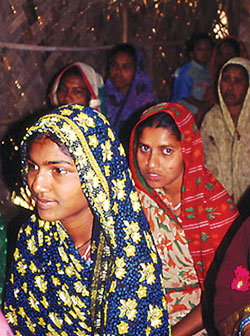 For Bangladeshi Mohammad Yunus and his brainchild, Grameen Bank, the Nobel Peace Prize was perhaps always on the cards.
For Bangladeshi Mohammad Yunus and his brainchild, Grameen Bank, the Nobel Peace Prize was perhaps always on the cards.
While traditional money lenders fleece the poor through exorbitant interest rates and collaterals, the modern banking system finds it too risky to deal with small unsecured loans.
Grameen Bank offered poor Bangladeshis access to funds without any financial security.
By empowering women and self-help groups to lend and collect money, they have had 98 percent recovery, a fact that commercial banks should envy. They are saddled with virtually no non-performing assets. Their network has now been used successfully in bringing about a communication revolution through telephone and mobile phone distribution. Grameen's success has now become a model for global replication.
A few successful strategies in the world have benefited the poor and made the world of microfinance as distinguished as the world of finance. This has also prompted others, like India's ICICI, to integrate some of Grameen's successes into their own lending strategy. These have been well-documented as a case study in Fortune at the Bottom of the Pyramid. Indeed, Bangladesh owes a lot to the Grameen revolution for improving its macroeconomic indicators over the past two decades.
In Nepal however, our model replication practices have yielded limited results. While in name we have borrowed 'Grameen', in practice there is little that has happened in the world of Nepali microfinance. Perhaps it is because of our own half-hearted Nepali way of doing things or the plethora of aid agencies that try to tweak the strategies, which is why we have yet to see any comparable revolutions.
We do have a bunch of Grameen banks that love to draw parallels with the Bangladeshi institution, but have never been able to reach and penetrate the most rural parts of Nepal where the moneylender sahu still takes a goodly pound of flesh.
When cooperative financial institutions opened up in our country, they could have taken the initiative to be a good tool for providing the poor with access to finance. However, they have basically become unregulated financial service institutions that compete with commercial banks without the banking industry's stringent regulations. Promoters of these cooperatives have gotten rich without having to deal with regulations or providing real access to finance to the marginalised.
For Nepal, there are multiple lessons in Yunus's endeavours.
First is that the transformation of any sector that has national impact depends on homegrown agents of change who can provide the leadership to challenge conventional practices. Efforts for change have to be relentless; there is no shortcut to success. This Beed has remarked that we Nepalis tend to be happy with quick, if temporary, popularity, rather than reinforcing longterm successes.
Secondly, the Grameen movement was homegrown. Yunus received a lot of impetus from bi-laterals and multi-laterals, but he drove the core strategy with his team. Outsiders can successfully supplement strategies, but those drawn by them tend to have fewer chances of success. For Nepal, the tendency of donors to sit in the driver's seat, instead of just supporting good ideas, has led to no major nationwide initiatives like Grameen.
Finally, the search for our own agents of change should begin with support from both Nepalis and donors. Perhaps, one day, we can be proud of our own Nobel Prize winner and institution.



